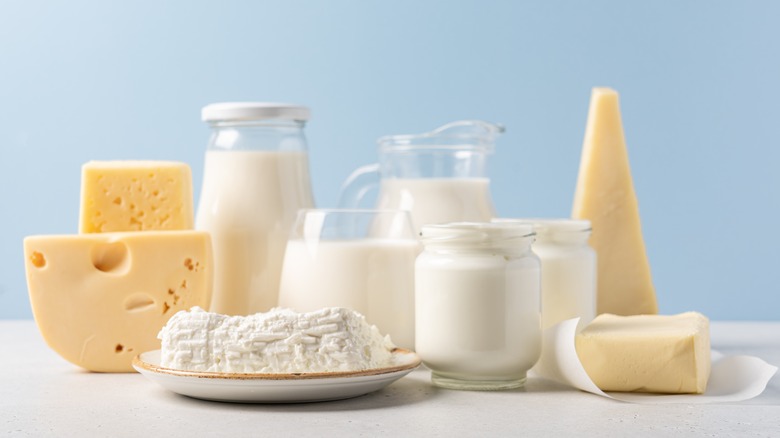Natural Ways To Fight The Dreaded Menopausal Weight Gain
Menopause is a biological process that takes place when a woman's menstruation permanently stops. This usually occurs after the woman hits the age of 45, and it's a period when the ovaries produce less hormones such as estrogen and progesterone. As the body reaches this phase, there are certain physical changes that also take place.
Among the unwanted effects of menopause are weight gain and a slowing metabolism, and the reason for this is the sudden decrease of estrogen in the body. Since it is an important hormone that regulates metabolism and body weight, the abrupt hormonal drop often results in weight gain.
While menopause and hormonal changes are inevitable, weight gain can be prevented. Rosemary C. Sousa, M.D., OB/GYN, said via Norton Healthcare, "Even though menopause weight gain is common, it can still be prevented. For example, implementing healthy lifestyle habits, such as diet and exercise, can go a long way."
Integrate a physical activity in your daily routine
Being physically active helps in fighting midlife weight gain. If you're a beginner, start with beginner-friendly exercises that last for 10 minutes a day. Then gradually increase the frequency and intensity of your workout.
Pamela Peeke, M.D., MPH, and author of "Body for Life for Women," told Everyday Health that high-intensity interval training is a reliable exercise that helps with losing the menopausal weight gain. She said, "What you want to employ now is high-intensity interval training (HIIT). Basically that means that moderate levels of exercise are interspersed with high intensity intervals throughout the week."
Incorporating at least 30 minutes of aerobic activity on a daily basis is highly recommended, and you should mix your workouts with moderate and high intensity. It would also help if you can include cardio exercises such as brisk walking, swimming, running, or cycling.
Make sure to add dairy and fiber to your diet
You should start including healthier food into your diet while limiting processed foods. It's important to note that your food intake has a massive impact on your weight loss, since diet plans are proven to work well during the menopause stage (per Healthline). Some dairy products that you can integrate into your diet include butter, cheese, ice cream, yogurt, and condensed and dried milk.
The decline in estrogen makes women vulnerable to fractures, so in addition to the weight loss benefits of dairy products, it can also help you keep your bones healthy. Dairy products are known to be rich in calcium, phosphorus, potassium, and vitamins D and K – nutrients that play a role in bone health.
Aside from adding dairy products to your diet, it is also best if you eat food rich in fiber. Fiber-rich foods can help you manage your insulin and blood sugar response to food. These foods include flaxseeds, Brussels sprouts, avocados, and broccoli.
Control your intake and eat more nutritious food
Make sure to avoid crash diets when trying to resolve the menopausal weight gain. This might give you immediate results, but it's only short-term because it's not sustainable. If you are planning to maintain your weight prior to your menopausal stage, research suggests that you should eat less. Per Mayo Clinic, you might need to tone down your calorie intake and reduce it to 200 calories lower on a daily basis. Since this can result in lower nutrient intake as well, you should be a mindful eater. Rather than choosing to eat out, you should opt for a home-cooked meal. Instead of snacking on junk, you should eat more fruits.
A plant-based diet can help you reduce menopausal symptoms, and including legumes, nuts, soy, and fish in your diet will go a long way. You should also limit your meat consumption, and you can trade butter and margarines for healthier vegetable or olive oils.
Cut back on your sweet habit
USA Today published an article in 2014 claiming that added sugar accounts for about 15% of the total calorie intake of an average American diet. That's about 300 calories a day based on a 2,000-calorie diet. These calories usually come from sugar-sweetened beverages, such as soft drinks, juices, energy drinks, and sweetened coffee.
When you start going through menopause, it's highly suggested that you cut back on your sugar intake, as sugar and menopause just don't mix well. With the decrease in the body's estrogen and progesterone, the cells in the body start to be more resistant to insulin. Insulin resistance leads to weight gain, so it's best to minimize your sugar intake.
In addition, during menopause, women's bodies take more work in managing blood sugar. Changes in hormone levels can trigger abrupt fluctuations in your blood sugar, making the body vulnerable to a lot of diseases such as Type 2 diabetes, heart disease, and some cancers.
Meditate and avoid stress at all costs
National Library of Medicine published research linking sleep disturbances to body disruption during menopause. Since the changes in the body during the menopause stage can drastically affect your sleep patterns, this might leave you feeling drained and stressed. During this period, women may experience intense warmth in the upper body, particularly in the neck, face, and chest. These are called hot flashes, which normally happen while women's bodies transition. Oftentimes, these flashes occur at night, in which case, it is called night sweats.
While night sweats do not directly result in weight gain, they can disturb your sleep, which can ultimately lead to an increase of stress, weight gain, and may affect your metabolism. Although you cannot prevent night sweats, you can prevent stress taking over your body. Take the time to relax and use simple meditation techniques before going to sleep. It can also help if you unload your stress by reaching out to a friend, family member, or a therapist.
Be mindful though, while these are deemed normal during menopause, night sweats and hot flashes can indicate a more serious condition, so if it becomes a serious problem for you, consult your doctor.





